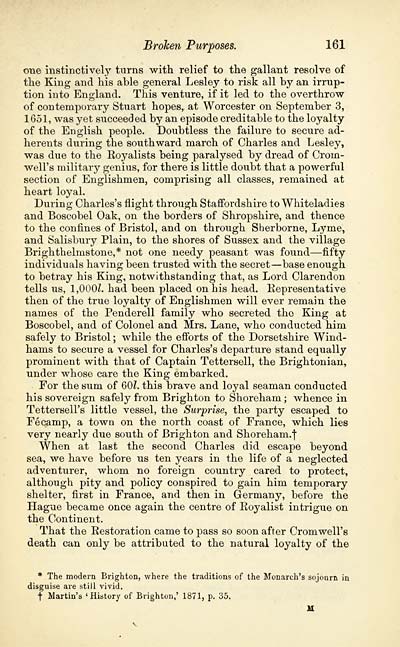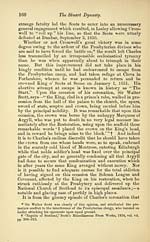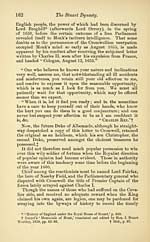Stuart dynasty
(181) Page 161
Download files
Complete book:
Individual page:
Thumbnail gallery: Grid view | List view

Broken Purposes. 161
one instinctively turns with relief to the gallant resolve of
the King and his able general Lesley to risk all by an irrup-
tion into England. This venture, if it led to the overthrow
of contemporary Stuart hopes, at Worcester on September 3,
1 651, was yet succeeded by an episode creditable to the loyalty
of the English people. Doubtless the failure to secure ad-
herents during the southward march of Charles and Lesley,
was due to the Royalists being paralysed by dread of Crom-
well's military genius, for there is little doubt that a powerful
section of Englishmen, comprising all classes, remained at
heart loyal.
During Charles's flight through Staffordshire to Whiteladies
and Boscobel Oak, on the borders of Shropshire, and thence
to the confines of Bristol, and on through Sherborne, Lyme,
and Salisbury Plain, to the shores of Sussex and the village
Brighthelmstone,* not one needy peasant was found — fifty
individuals having been trusted with the secret — base enough
to betray his King, notwithstanding that, as Lord Clarendon
tells us, 1,000Z. had been placed on his head. Representative
then of the true loyalty of Englishmen will ever remain the
names of the Penderell family who secreted the King at
Boscobel, and of Colonel and Mrs. Lane, who conducted him
safely to Bristol ; while the efforts of the Dorsetshire Wind-
hams to secure a vessel for Charles's departure stand equally
prominent with that of Captain Tettersell, the Brightonian,
under whose care the King embarked.
For the sum of 60Z. this brave and loyal seaman conducted
his sovereign safely from Brighton to Shoreham ; whence in
Tettersell's little vessel, the Surprise, the party escaped to
Fecamp, a town on the north coast of France, which lies
very nearly due south of Brighton and Shoreham."]"
When at last the second Charles did escape beyond
sea, we have before us ten years in the life of a neglected
adventurer, whom no foreign country cared to protect,
although pity and policy conspired to gain him temporary
shelter, first in France, and then in Germany, before the
Hague became once again the centre of Royalist intrigue on
the Continent.
That the Restoration came to pass so soon after Cromwell's
death can only be attributed to the natural loyalty of the
* The modern Brighton, where the traditions of the Monarch's sojourn in
disguise are still vivid.
f Martin's 'History of Brighton,' 1871, p. 35.
il
one instinctively turns with relief to the gallant resolve of
the King and his able general Lesley to risk all by an irrup-
tion into England. This venture, if it led to the overthrow
of contemporary Stuart hopes, at Worcester on September 3,
1 651, was yet succeeded by an episode creditable to the loyalty
of the English people. Doubtless the failure to secure ad-
herents during the southward march of Charles and Lesley,
was due to the Royalists being paralysed by dread of Crom-
well's military genius, for there is little doubt that a powerful
section of Englishmen, comprising all classes, remained at
heart loyal.
During Charles's flight through Staffordshire to Whiteladies
and Boscobel Oak, on the borders of Shropshire, and thence
to the confines of Bristol, and on through Sherborne, Lyme,
and Salisbury Plain, to the shores of Sussex and the village
Brighthelmstone,* not one needy peasant was found — fifty
individuals having been trusted with the secret — base enough
to betray his King, notwithstanding that, as Lord Clarendon
tells us, 1,000Z. had been placed on his head. Representative
then of the true loyalty of Englishmen will ever remain the
names of the Penderell family who secreted the King at
Boscobel, and of Colonel and Mrs. Lane, who conducted him
safely to Bristol ; while the efforts of the Dorsetshire Wind-
hams to secure a vessel for Charles's departure stand equally
prominent with that of Captain Tettersell, the Brightonian,
under whose care the King embarked.
For the sum of 60Z. this brave and loyal seaman conducted
his sovereign safely from Brighton to Shoreham ; whence in
Tettersell's little vessel, the Surprise, the party escaped to
Fecamp, a town on the north coast of France, which lies
very nearly due south of Brighton and Shoreham."]"
When at last the second Charles did escape beyond
sea, we have before us ten years in the life of a neglected
adventurer, whom no foreign country cared to protect,
although pity and policy conspired to gain him temporary
shelter, first in France, and then in Germany, before the
Hague became once again the centre of Royalist intrigue on
the Continent.
That the Restoration came to pass so soon after Cromwell's
death can only be attributed to the natural loyalty of the
* The modern Brighton, where the traditions of the Monarch's sojourn in
disguise are still vivid.
f Martin's 'History of Brighton,' 1871, p. 35.
il
Set display mode to:
![]() Universal Viewer |
Universal Viewer | ![]() Mirador |
Large image | Transcription
Mirador |
Large image | Transcription
Images and transcriptions on this page, including medium image downloads, may be used under the Creative Commons Attribution 4.0 International Licence unless otherwise stated. ![]()
| Histories of Scottish families > Stuart dynasty > (181) Page 161 |
|---|
| Permanent URL | https://digital.nls.uk/94819938 |
|---|
| Description | A selection of almost 400 printed items relating to the history of Scottish families, mostly dating from the 19th and early 20th centuries. Includes memoirs, genealogies and clan histories, with a few produced by emigrant families. The earliest family history goes back to AD 916. |
|---|

